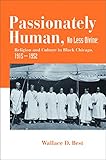Passionately human, no less divine : religion and culture in Black Chicago, 1915-1952 / Wallace D. Best.
Material type: TextPublication details: Princeton, NJ : Princeton University Press, (c)2005.Description: 1 online resource (xxi, 250 pages) : illustrationsContent type:
TextPublication details: Princeton, NJ : Princeton University Press, (c)2005.Description: 1 online resource (xxi, 250 pages) : illustrationsContent type: - text
- computer
- online resource
- 9781400849345
- BR563 .P377 2005
- COPYRIGHT NOT covered - Click this link to request copyright permission: https://lib.ciu.edu/copyright-request-form
| Item type | Current library | Collection | Call number | URL | Status | Date due | Barcode | |
|---|---|---|---|---|---|---|---|---|
 Online Book (LOGIN USING YOUR MY CIU LOGIN AND PASSWORD)
Online Book (LOGIN USING YOUR MY CIU LOGIN AND PASSWORD)
|
G. Allen Fleece Library ONLINE | Non-fiction | BR563.53 (Browse shelf(Opens below)) | Link to resource | Available | ocn860711618 |
Includes bibliographies and index.
"Mecca of the migrant mob" -- The South in the city. -- Southern migrants and the new sacred order. -- The frenzy, the preacher, and the music. -- The Chicago African Methodist Episcopal Church in crisis. -- A woman's work, an urban world.
Passionately human, no less divine analyzes the various ways black southerners transformed African American religion in Chicago during their Great Migration northward. A work of religious, urban, and social history, it is the first book-length analysis of the new religious practices and traditions in Chicago that were stimulated by migration and urbanization. The book illustrates how the migration launched a new sacred order among blacks in the city that reflected aspects of both Southern black religion and modern city life. This new sacred order was also largely female as African American women constituted more than 70 percent of the membership in most black Protestant churches. Ultimately, Wallace Best demonstrates how black southerners imparted a folk religious sensibility to Chicago's black churches. In doing so, they ironically recast conceptions of modern, urban African American religion in terms that signified the rural past. In the same way that working class cultural idioms such as jazz and the blues emerged in the secular arena as a means to represent black modernity, he says, African American religion in Chicago, with its negotiation between the past, the present, rural and urban, revealed African American religion in modern form.
COPYRIGHT NOT covered - Click this link to request copyright permission:
There are no comments on this title.
